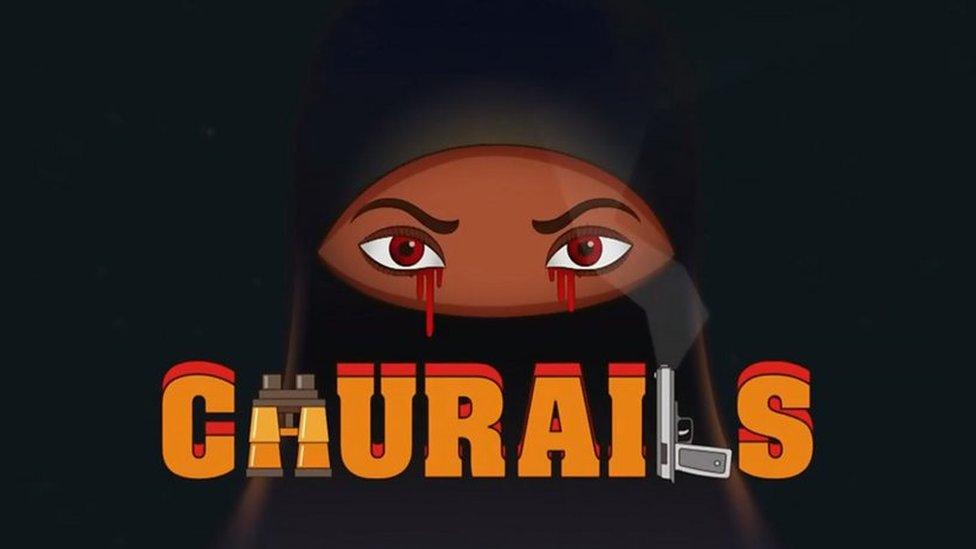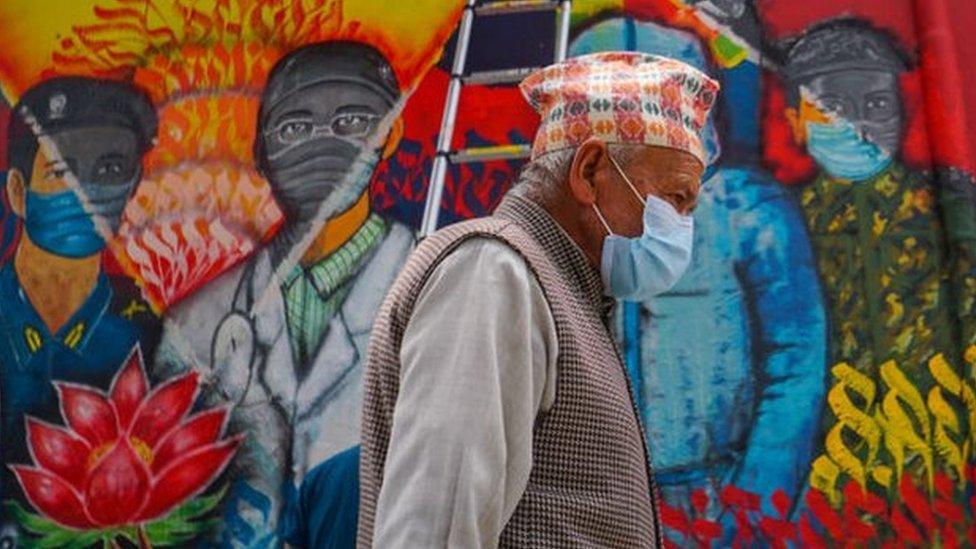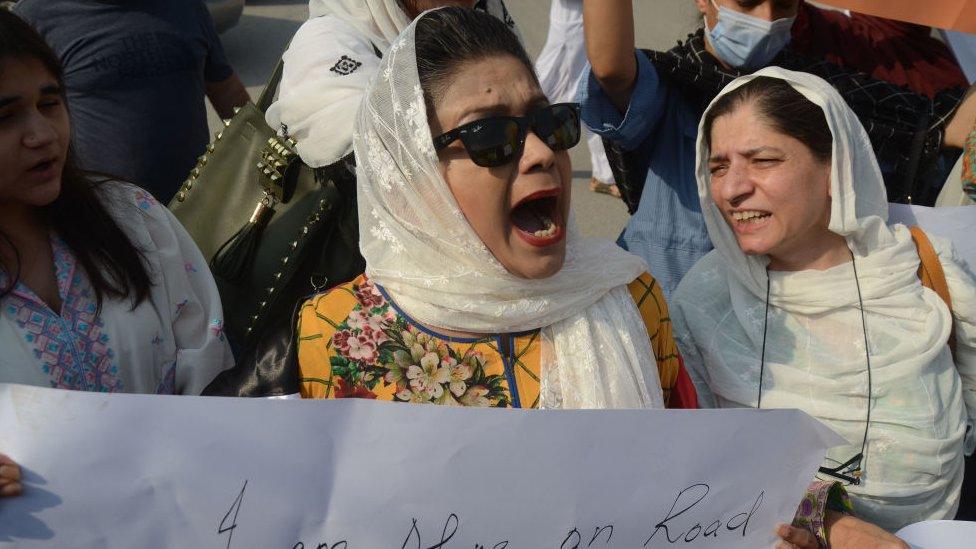Churails: Why a feminist detective show was banned in Pakistan
- Published

The web series features a group of women who set up a detective agency
A new Pakistani web series called Churails has created an uproar in the country for its bold subject matter and depiction of its female leads.
The 10-episode series features a group of women from diverse backgrounds who get together to start a secret detective agency called Churails - the Urdu word for "witch".
The show ran into controversy when the country's media regulatory body banned it in Pakistan after a backlash over a clip from the series that went viral on social media.
The regulator asked Indian video-on-demand platform Zee5, which streamed the show, external, to take the series down for Pakistani audiences, and the platform complied.
Taking to Twitter on 7 October, the show's director Asim Abbasi expressed his despair at the move, saying he was utterly disappointed that artistic freedom and content that was appreciated abroad was being smothered in its country of origin.
However, following much criticism the web series was restored for Pakistan-based audiences on Zee5, something that's been confirmed by Abbasi.
But by then most Pakistanis had reportedly already watched the pirated version of the show on other websites.
Uncovering harsh realities
The show is about four women - an upper-class lawyer-turned-housewife, a snobbish event planner, a teenage boxer, and a fresh-out-of-jail murderer - brought together by patriarchal injustices. Joined by more women, they start a fashion boutique as a facade for their secret agency.
Allow Instagram content?
This article contains content provided by Instagram. We ask for your permission before anything is loaded, as they may be using cookies and other technologies. You may want to read Meta’s Instagram cookie policy, external and privacy policy, external before accepting. To view this content choose ‘accept and continue’.
The aim of their detective work is to help other women find out details about husbands who they suspect are cheating on them.
But as the show progresses it touches upon pressing issues such as child marriage, harassment, abuse, forced marriages, racism, class inequalities, homosexuality and society's collective obsession with a fair complexion.
From threatening an abusive husband to saving a Churails member from a forced marriage, the agency members' niqabs - Islamic face veils - are instrumental in protecting their anonymity during their missions.
The show uncovers some harsh realities of Pakistani society and ends on a cliffhanger, suggesting a second season.
In an interview with prominent Indian newspaper The Hindu, the four leads of the show said: "Churails is not a happy meal. Everybody can't love it. All four of us are, in our own right, advocates of something as simple as civil liberties and equality for all."
'Game changer' for Pakistani women
The show has garnered rave reviews in both Pakistan and India, with some commentators even terming it a "game changer" for women in Pakistan.
Critics and experts have both hailed the show, saying it breaks new ground, smashes stereotypes and puts strong women at the centre of its story.
Allow Instagram content?
This article contains content provided by Instagram. We ask for your permission before anything is loaded, as they may be using cookies and other technologies. You may want to read Meta’s Instagram cookie policy, external and privacy policy, external before accepting. To view this content choose ‘accept and continue’.
Calling Churails "a feminist masterpiece", prominent Pakistani daily The Express Tribune said the show "can be a conversation-starter for many, if not anything else".
"Churails is definitely not what Pakistani drama and soap watchers are used to, but the show and its creators remain unapologetic," said Pakistan's leading English-language newspaper Dawn. It added that the show has taken Pakistani "drama aficionados by storm" with all the "right ingredients".
Similarly, Indian newspaper The Indian Express said "the real strength of the series comes from getting up close and very personal with the women".
Social media backlash
The web series has faced a strong backlash in its country of origin over its depiction of women drinking alcohol, wearing what are considered questionable clothes in the conservative society, and using foul language.
A clip from the show, which began streaming in August, went viral on social media.
It showed one of the characters, Sherry, played by veteran actor Hina Khawaja Hayat, talking explicitly about giving sexual favours to men in order to climb the ladder of success. This particular scene infuriated social media users who said such content promoted vulgarity and should be banned.
The Muslim-majority country usually takes a strict line on content that is deemed too bold for TV and web series. The most recent example was a biscuit advertisement described as "indecent" by the country's media regulatory body Pakistan Electronic Media Regulatory Authority (PEMRA).
Supportive voices
The Pakistan government's ban on the series did not go down well with actors, filmmakers and other celebrities, evoking strong reactions.
Prominent Pakistani actor Usman Khalid Butt posted a series of tweets expressing his rage and reminding the authorities to work on solving a rape case that has made headlines in recent days.
"Oh, you got Churails banned? Congratulations. Now please focus your outrage on the fact that police have failed to arrest the prime accused in the motorway rape incident", Butt tweeted.
Popular actress Sanam Saeed also expressed similar sentiments over the curbs on content.
She tweeted: "Banning dancing ads, outspoken films and web-series will not end rape if that's the agenda. Why are we riddled with such hypocrisy? Buss bandh darvaazon kay peechay ho sub (Everything should happen behind closed doors?)".
Famous podcaster Uzair Younus wrote: "It's amazing that men in a country with one of the highest rates of porn viewership have a problem with a scene from #Churails that highlighted the grim reality of what women must deal with at the workplace. Ban action movies too as Pak [Pakistan] has had a crisis of violence and killing!"
- Published2 August 2021

- Published19 September 2020
